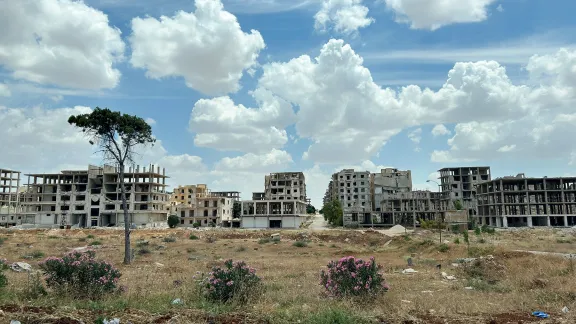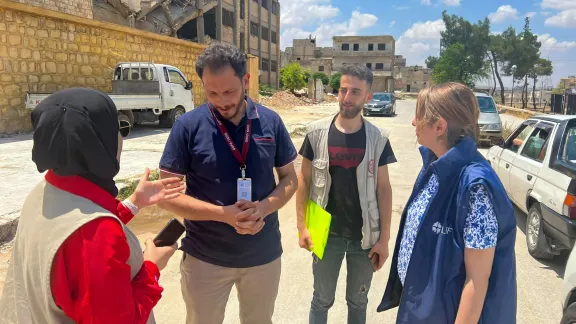LWF joins NGO calls to provide more funding to support Syrians and to remove hindrances to the delivery of a principled, timely and efficient humanitarian response

Destruction in Aleppo. Photo: LWF/ A. Calma
LWF joins NGO calls to provide more funding and to re-evaluate sanctions
(LWI) - As the European Union convenes the Seventh Conference on ‘Supporting the future of Syria and the region’ on 14 and 15 June 2023, in Brussels, LWF has joined two calls by aid agencies to better support those affected by the Syrian crisis, and to remove hindrances to a timely and effective humanitarian response.
“Syrians need our help, now more than ever," says Allan Calma, LWF’s Global Humanitarian Coordinator.
“Syrians need our help, now more than ever”
- Allan CALMA, LWF Global Humanitarian Coordinator.
More humanitarian space in Syria
Data by the UN refugee agency UNHCR shows how difficult life has become for Syrian refugees: Every fifth person and every other youth in Jordan is unemployed. The refugees have used up their savings and taken out loans to meet daily expenses. Nine out of ten families are in debt and many resort to negative coping mechanisms such as illegal work and forced child marriage. Despite immense needs, the Syria response continues to be severely underfunded with 2023 funding of the Humanitarian Response Plan barely reaching 12 percent.
The first call, published by the Jordan INGO Forum, of which LWF is a member, highlights the protracted crisis and the “deteriorating economic and living conditions” of Syrian refugees. It calls for more funding to the refugee response: “Despite Jordan’s stretched resources, the international community is yet to fulfill their commitments.” Jordan currently hosts more than 700,000 registered refugees. The Jordanian government estimates that there are even more unregistered refugees, and that the actual number is about 1.3 million – one tenth of the country’s population.
LWF also joined a call released by the ACT Syria Forum, a platform for Christian aid organizations working in Syria. The statement highlights the impact of sanctions and calls for a legal revision of the sanctions framework and the opening of humanitarian exemptions beyond the earthquake response.
“We urge the Brussels conference and the international community to understand how coercive measures, the lack of funding and aid politicization have and continue to hinder the delivery of a principled, timely and efficient humanitarian response which the population of Syria is entitled to, and to take the necessary actions to tackle those challenges”, the statement reads.
LWF is present in Syria and Jordan, and the work encompasses humanitarian relief, recovery, livelihood, protection and social cohesion activities. LWF focuses on vulnerable individuals like children, people living with disabilities and female headed households.

LWF Jordan Country Representative Ameera Khamees and Program Coordinator Islam Shdefat speak to local partner GOPA DERD in front of a collective shelter housing 45 families affected by the earthquakes. Photo: LWF/ C. Tveoy
"More and better support is needed”
“In both places, despite complex challenges, the people, partners and communities we work with continue to demonstrate strong resilience and perseverance,” says Ameera Khamees, LWF Country Director for Jordan and Syria. “More and better support is needed to allow them to build hope and a future”.
A team from LWF is currently in Syria to collect updated information on the earthquake response and to meet with existing and prospective local partners.
"It is a terrible tragedy that humanitarian agencies are being forced to make difficult prioritization decisions amongst even the most basic of needs: food, medicine and shelter”, added Calma.


